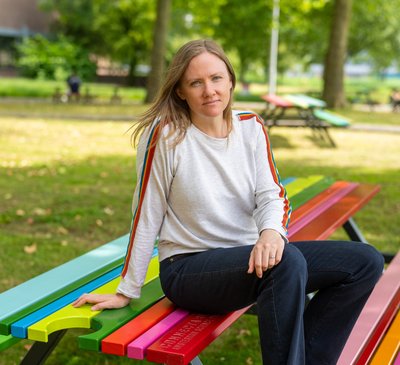Quantum computing is an exciting field of research, according to CWI researcher Stacey Jeffery. Last May, she also became professor by special appointment of quantum information at the University of Amsterdam. Here, she describes her research and her ambition to attract more women to the field.
How did you get involved in quantum development?
"When I was a bachelor’s student in computer science at the University of Waterloo in Canada, I knew nothing about quantum computing. It sounded super cool though, so I took an introductory course. I was immediately fascinated by the idea of using quantum mechanics to perform computational tasks. It was a totally new field back then, and it felt like there was so much uncharted territory to explore."
In your inaugural lecture, you compared quantum algorithms to random walks in the park. What did you mean?
"Quantum algorithms are different from algorithms for classical computers. Some classical algorithms are deterministic, going from one step to the next in a predetermined way. Others make random choices. Many of these can be modelled by something called a random walk. While quantum algorithms are not the same as classical algorithms, these random walk algorithms are a good analogy. If we augment random walks with something called interference, meaning two paths can cancel, like when 1 and -1 add to 0, then we get a model powerful enough to describe all quantum algorithms."
What developments did you witness in the field and how will the field progress in the future?
"The most dramatic change has been a shift in the makeup of the research community from almost entirely academic to having a large component from companies and government agencies. I think it will be increasingly important to work together, as in the coming decades, we might start seeing industrial applications of quantum computers. Right now, we are developing algorithms that we cannot run. But in the future we expect this to change, which will also impact how algorithms are developed."
Besides your research, you also try to get more women involved in quantum development. Why is that so important?
"There is something called the leaky pipeline, which is the phenomenon of women leaving many STEM (science, technology, engineering and mathematics) fields at a higher rate than men at all levels. I believe that one reason for this is that it is hard to be a minority. When things get difficult, women do not always have colleagues of the same gender to go to for advice or to commiserate with. That is why Julia Cramer of Leiden University and I founded Women in Quantum Development (WIQD, pronounced ‘Wicked’), a supporting network for women in the field."

